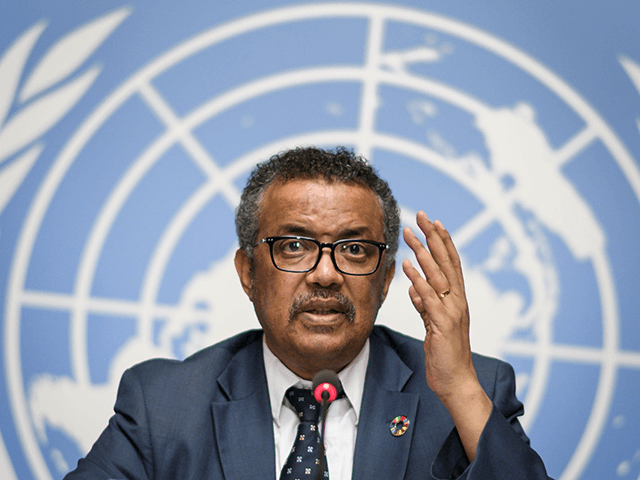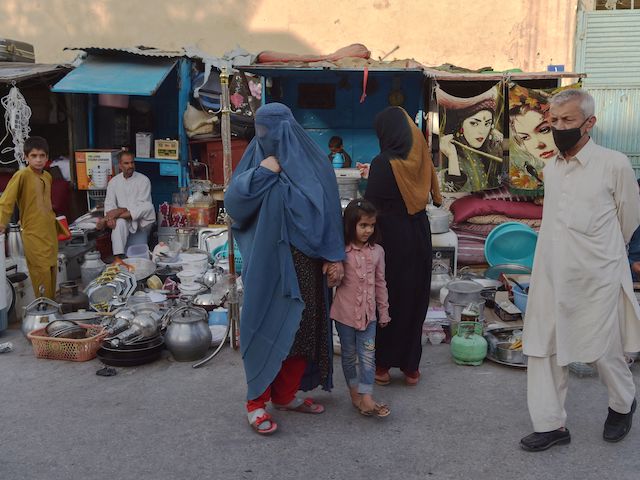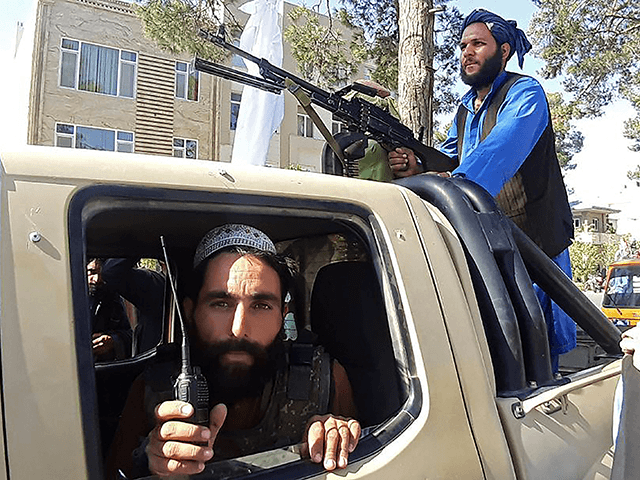The United Nations Security Council passed a resolution on Monday – without support from Russia and China – requesting that Taliban terrorists respect human rights in Afghanistan.
The U.N. has not published the full text of the resolution at press time, but media organizations privy to the text have reported that it presents the Taliban with three main requests: to allow the United Nations and other groups “full, safe, and unhindered” access to Afghanistan; to not affiliate with other terrorists; and to respect human rights.

World Health Organization (WHO) Director General Tedros Adhanom Ghebreyesus gestures during a press conference at the United Nations Office in Geneva. (Photo by FABRICE COFFRINI/AFP via Getty Images)
The text, according to France24, “reaffirms the importance” of human rights and, particularly, “full, equal and meaningful representation of women.”
The Taliban, which previously ruled Afghanistan from 1996 to 2001 – ousted by the U.S. invasion following the September 11, 2001, jihadist attacks on American soil – has a decades-long record of committing human rights atrocities, excusing them as necessary under its interpretation of sharia, or Islamic law. In the aftermath of the Taliban’s takeover of the country on August 15, Taliban spokesmen have insisted that they would respect human rights, allow girls to attend school, and permit women to participate in the workforce.
In reality, Taliban officials demanded all women stay home indefinitely, warned all Afghan civilians not to play music (expressing hope they will not need an official ban), and have reportedly been going around Kabul physically assaulting, and disappearing, people suspected to have worked with the United States.

A burqa clad Afghan woman looks for items to buy at a shop displaying used household items for sale at a market area in Kabul on August 25, 2021, which were earlier purchased from the people who faced financial adversities and those who fled the country after Taliban’s military takeover of Afghanistan. (Photo by WAKIL KOHSAR/AFP via Getty Images)
Reuters reported last week that the United Nations has documented physical attacks by the Taliban on its own workers and the looting of U.N. agency headquarters in Kabul. The U.N. has not confirmed these attacks, but has publicly denounced violence against civilians by the Taliban.
While the U.N. has not yet published the Security Council resolution passed on Monday, it published a summary of the discussion that preceded the vote. The 15 nations participating took the opportunity to condemn “in the strongest terms the deadly blasts at Kabul airport on Thursday,” a suicide attack that left nearly 200 dead. The Islamic State took responsibility for the attack, though Taliban guards were reportedly in charge of security at the airport.
The U.N. summary noted that only China and Russia of the 15 member states of the Security Council abstained, and both complained that they had pitched edits to the resolution that never made it into the final product. Russian Ambassador Vassily Nebenzia claimed that Moscow had “principled concerns” about the absence of a mention of the “East Turkistan Islamic Movement” (ETIM), an alleged Uyghur jihadist organization that the U.S. removed from its list of foreign terrorist organizations last year on the grounds that no evidence suggests it exists. Russia’s complaint appeared to be meant as support for communist China, which uses ETIM to excuse its ongoing genocide against the Uyghur people of East Turkistan, which China refers to as its western Xinjiang province.
Chinese Ambassador Geng Shuang notably only mentioned ETIM in passing in his statement, not in the context of objecting to the resolution. Instead, Geng protested that the statement did not demand the United States do more to help the Taliban succeed as the functional government of Afghanistan.
“China has huge doubts about the necessity and urgency of adopting this resolution and the balance of its content,” Geng said. “The recent chaos in Afghanistan is directly related to the hasty and disorderly withdrawal of foreign troops. We hope that relevant countries will realize the fact that withdrawal is not the end of responsibility, but the beginning of reflection and correction.”
Geng specifically requested of these countries – paramount among them the United States – and the greater international community “provide Afghanistan with urgently needed assistance for the economy, livelihood and humanitarian needs in order to help the new authority [the Taliban] maintain the normal operations.”
American envoy Linda Thomas-Greenfield left open the possibility that the United States would directly aid the Taliban.
“The United States is absolutely committed to helping our partners on the ground provide food, protection, shelter, essential healthcare, water, sanitation, hygiene services, and so much more vital humanitarian aid to Afghans,” Thomas-Greenfield said.
The Security Council had yet to implement and concrete resolutions on the Taliban conquest of Afghanistan this month, initially only issuing a statement calling for an “inclusive” Taliban government. The statement echoed the Taliban’s own propaganda portraying itself as a peaceful entity merely seeking to oust an occupying force from its native land.
Other U.N. agencies have similarly avoided negative commentary about the Taliban terrorist organization. UNICEF’s top official in Afghanistan, Mustapha Ben Messaoud, described himself as “quite optimistic” about the Taliban respecting the rights of girls shortly after the Kabul takeover. The World Food Programme (WFP) recently sent its executive director, David Beasley, to meet with senior members of the Taliban in Qatar, according to a Taliban spokesman.
“They discussed humanitarian issues and ongoing situation [sic] of Afghanistan including problems emerged [sic] as a result of drought and pandemic,” spokesman Suhail Shaheen claimed.
The U.N. Human Rights Council (HRC) has yet to formally weigh in on the disaster in Afghanistan through a resolution. A draft circulating last week reportedly did not mention the Taliban at all, instead echoing the language of what passed in the Security Council on Monday, calling for “unwavering commitment to the rights of women and girls.”
Representatives from Pakistan, an Islamist country that openly celebrated the Taliban’s rise to power, reportedly wrote the draft.

COMMENTS
Please let us know if you're having issues with commenting.